Home » Posts tagged 'canada' (Page 14)
Tag Archives: canada
Both Notley and Kenney Hiding from a $260-Billion Cleanup Problem
Both Notley and Kenney Hiding from a $260-Billion Cleanup Problem
The Alberta government may well leave taxpayers to clean up the oil and gas industry’s mess.
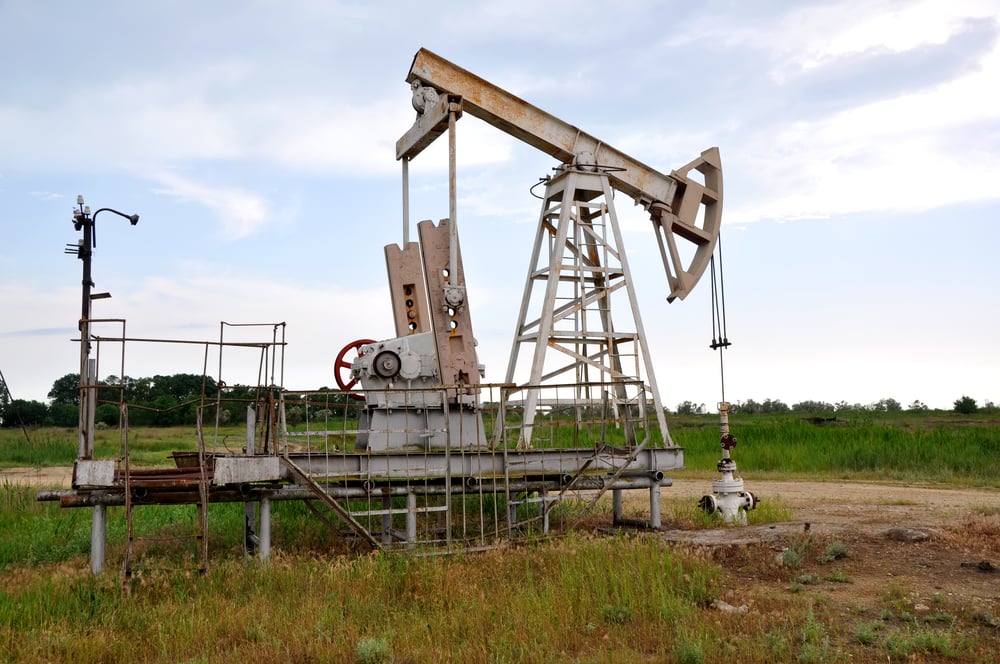
The main thing Jason Kenney and Rachel Notley have in common, other than their affinity for pipelines, is their joint fear of the possible $260-billion cleanup bill for the province’s aging oil and gas fields.
Neither Kenney, the United Conservative Party leader, nor NDP Premier Notley have said much on the hustings about this astounding liability, which includes tens of thousands of inactive wells, abandoned gas plants, oil sands tailing ponds and 400,000 kilometres of pipelines.
The mountainous size of the cleanup costs dwarfs the puny pile of security deposits the province has collected from industry to pay for the cleanup — $1.5 billion.
Regan Boychuk, a 41-year-old Calgary roofer, independent researcher and a driving member of the Alberta Liabilities Disclosure Project, understands why Kenney and Notley don’t want to talk about such embarrassing math.
“I think this issue is too big and too scary for both government and industry to face. It is a can of worms,” said Boychuk in a Tyee interview.
But if not corrected, the scale of the problem could affect the province’s credit rating, bankrupt hundreds of smaller oil and gas firms and leave Canadian taxpayers with the mother of all cleanup bills.
This has happened before.
Decades ago, Canada’s mining industry grossly underestimated what it needed for cleaning up acidic tailings and set aside paltry deposits for the job, just like the oil patch is doing today.
As soon as the mines stopped producing money, corporate Canada walked away from an estimated 10,000 abandoned or orphaned mines throughout the country, arguing they had run out of cash.
Taxpayers still need to spend billions on rehabilitating these mining sites.
…click on the above link to read the rest of the article…
New Canadian Bonds Are Backed By Junk Rated Retailers And Consumer Loans Charging 40% Interest
New Canadian Bonds Are Backed By Junk Rated Retailers And Consumer Loans Charging 40% Interest
In a unique twist on the excesses of the last credit bubble, Canada’s bond market is now issuing bonds backed by increasingly riskier assets, but that hasn’t stopped investors from jumping at the chance to buy them – because why would history ever repeat itself when central bankers are here to make sure there is no more risk, ever?
According to Bloomberg, some popular recent deals have included debt backed by assets like mortgages on junk-rated Hudson’s Bay stores and consumer loans that charge interest rates of up to 40%. There is also new debt being backed by home-equity lines of credit, credit cards, and auto loans/leases. Non-banking mortgage lenders may also soon issue similar debt, according to the report. In fact, the only thing that differentiates the current Canadian bond issuance frenzy from what took place in the US in 2005-2006 is… well… we’ll get back to you on that.

These bonds in Canada are starting to hit the market as Canada’s own bond market inverts with the yield on the 10 year government bond trading below the Bank of Canada’s overnight rate. Consumer spending has been poor and inflation has been weak in the country, however its economy recorded its best monthly advance in growth in eight months in January, and has an unemployment rate of 5.8%, a four decade low, so all must be well…
Randall Malcolm, senior managing director of fixed income at Sun Life Investment Management said: “The flattening of the curve, in which you see the ten year bonds inside the overnight rate is prompting investors to hunt for yield.”
…click on the above link to read the rest of the article…
Morneau is Flying Blind
Morneau is Flying Blind

The Trudeau Government continues to resist calls for an overhaul of its complex tax regime.
Yet Bill Morneau, Canada’s Minister of Finance, who was in town this week to address the Montreal Chamber of Commerce, wouldn’t name a single non-accountant that he knew who understands tax code.
Pressed by local media, the Minister admitted that he had no idea whether even his own university-educated daughters—who he has said are powerful influences on his political thinking—were able to complete their own returns.
“The subject never comes up at the supper table,” he joked.
Long-time tax reform activists greeted the news with a yawn.
“The Minister’s answer speaks for itself,” says Aaron Wudrick, a director at the Canadian Taxpayers Federation. “Nobody understands the tax code because it’s absurdly complex.”
Cracks in Canada’s centrally-planned economy
Less well-understood is the fact that even the brightest public officials can’t measure the far-reaching implications of the Income Tax Act and other complex legislation.
That’s because much of the government’s spending comes in the form of increases in unfunded liabilities and hidden transfers caused by interest rate suppression. These expenses are kept off of the government’s books, making them almost impossible for activists like Wudrick to challenge.
This in turn raises growing questions about the overall effectiveness of Canada’s centrally-planned economy, where public spending accounts for nearly half of GDP.
Some examples:
1. Subsidizing electric vehicles, but giving bigger breaks for gas-guzzlers
Morneau’s proudest achievements include the government’s environmental record, notably the measures announced in his budget to support the electric car industry.
Unfortunately, the Canadian government also provides billions of dollars of much-larger subsidies to buyers of gas-guzzling cars, trucks and SUVs.
…click on the above link to read the rest of the article…
RCMP’s Social Media Surveillance Symptom of Broad Threat to Privacy, Says BCCLA
RCMP’s Social Media Surveillance Symptom of Broad Threat to Privacy, Says BCCLA
Micheal Vonn isn’t surprised by RCMP’s ‘Project Wide Awake’ — but she’s worried.

It’s not surprising the RCMP is using sophisticated software to monitor the social media activities of Canadians, said Micheal Vonn, policy director of the BC Civil Liberties Association.
But it is worrying, she said.
On Monday The Tyee revealed the existence of the RCMP’s “Project Wide Awake,” which monitors the social media activities of Canadians on Facebook, Twitter, Instagram and other platforms.
The program’s expansion last year with sophisticated monitoring software appears to undermine the RCMP’s 2017 claim to the federal Privacy Commissioner that the project’s surveillance was “reactive” — done to gather information after a crime was committed.
The operation is now monitoring people’s online activities to see if they might commit a crime.
“I’m not surprised, but only because I spend a lot of time in this world,” said Vonn. “For most people, to hear that the police may be collecting their social media offerings for analysis, for future crime, is pretty shocking.”
But we’ve been heading in this direction for decades, Vonn said. Intelligence-based policing — the notion that if we have more information on citizens, we’ll have more effective policing — is in many ways uncontroversial, she noted.
A segment of the population wants police to gather more information about others. “Oh good, watch those guys, we don’t like them,” said Vonn.
But when people realize how much it could impact their own lives, they quickly become concerned, she said.
…click on the above link to read the rest of the article…
The ‘Big Short’ In Canada: Eisman Ups Bets Against “Big Six” Canadian Banks
The ‘Big Short’ In Canada: Eisman Ups Bets Against “Big Six” Canadian Banks
Over the last year, Neuberger Berman portfolio manager Steve Eisman – who gained notoriety beyond Wall Street thanks to ‘The Big Short’ and his portrayal by Steve Carrell in the movie adaptation – has taken seemingly every opportunity to talk his book, which apparently consists of concentrated bets against the financial systems of two developed nations: The UK and Canada.
Though UK banks largely bottomed out in October and have managed only a tepid rebound since, their Canadian peers have clawed back much of their losses from late last year. But this hasn’t shaken Eisman’s faith in his bet against Canadian banks, which is effectively a bet against the Canadian housing market (though Eisman doubts the fallout will be anywhere near as intense as the US housing market collapse that minted his reputation).
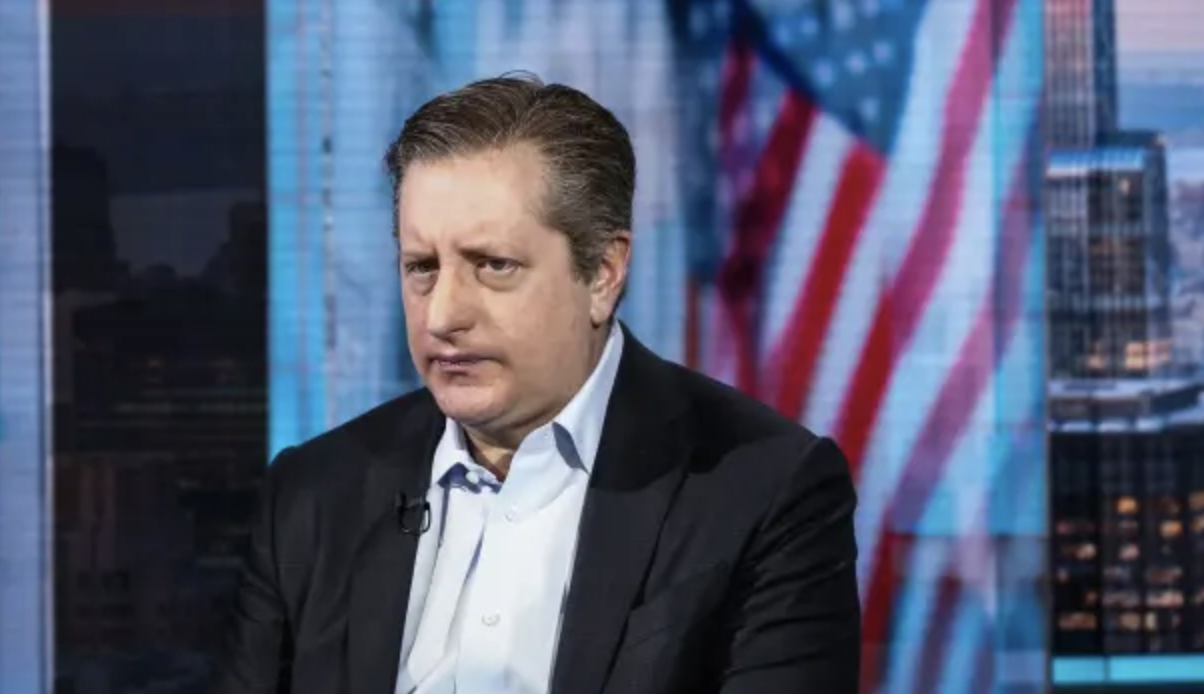
During an interview with the FT that was published on Thursday, Eisman explained that he’s simply betting on a “normalization of credit” in the Canadian economy, where lax lending terms fueled a housing bubble that has been tentatively acknowledged as a systemic risk by the Bank of Canada. For the first time ever, the central bank late last year even started buying mortgage bonds late last year to prop up the sliding Canadian housing market help increase the tradeable float of its benchmark securities
“I’m calling for a simple normalisation of credit that hasn’t happened in 20 years,” Mr Eisman told the FT, while declining to name the banks he is shorting, or the full extent of his positions.
Despite Risks, Canada’s Tar Sands Industry Is Betting Big on Oil Trains
Despite Risks, Canada’s Tar Sands Industry Is Betting Big on Oil Trains

Last year, Canada exported a record amount of tar sands oil to the U.S., despite low oil prices leading to major losses once again for the struggling tar sands industry. That achievement required a big bump in hauling oil by rail, with those daily volumes in late 2018 more than double the previous record in 2014 during the first oil-by-rail boom.
Canada’s oil industry essentially has reached its limit for exporting oil into the U.S. through pipelines. That’s why it’s turning to rail to export more and more oil, but as an ever-increasing number of oil trains hit the tracks of North America, expect more accidents and oil spills to follow.
If Canada can open up new pipeline capacity, this scenario may change. However, Enbridge recently announced its Line 3 pipeline replacement will be delayed until at least the second half of 2020. That means if Canadian tar sands companies want to increase exports, they will have to move that oil by rail. ConocoPhillips chief financial officer Don Wallette, Jr. recently confirmed this reliance on oil trains to the Wall Street Journal: “The intention is to bridge us over to the next major pipeline expansion, so a few years.”
This could result in a near doubling of the current record volumes of Canadian crude moving by rail. Trains potentially could haul over 600,000 barrels per day (bpd) in the next two years, an outcome I predicted four years ago when the Canadian industry was moving only 150,000 bpd of oil by rail.
To put these volumes in perspective, the Enbridge Line 3 pipeline will have a capacity of 760,000 bpd. Oil trains amount to a veritable pipeline on wheels.
…click on the above link to read the rest of the article…
“Ghastly” Vancouver Home Sales Crash By 33%, Lowest Since 1985
“Ghastly” Vancouver Home Sales Crash By 33%, Lowest Since 1985
On Monday, the Real Estate Board of Greater Vancouver reported February results that could be classified as ghastly, with residential home sales plummeting 32.8% year-over-year to 1,484 units. That’s the lowest February sales total since 1985 and 42.5% below the 10-year average.
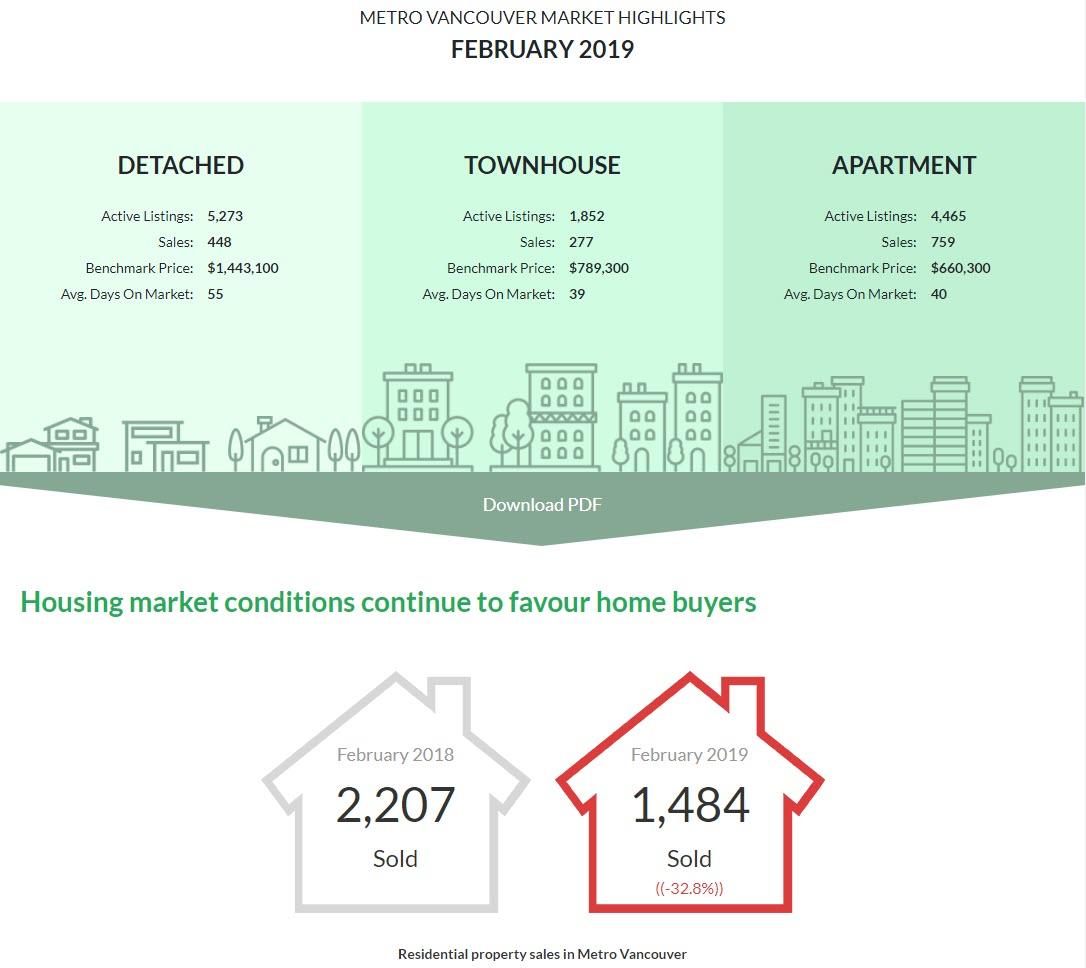
Prices have also broken lower, with the composite index sinking by 6.1% year-over-year. In addition, inventories have jumped, with total listings in metro Vancouver up to 11,590 homes at month end. That’s up 48.2% from February 2018.
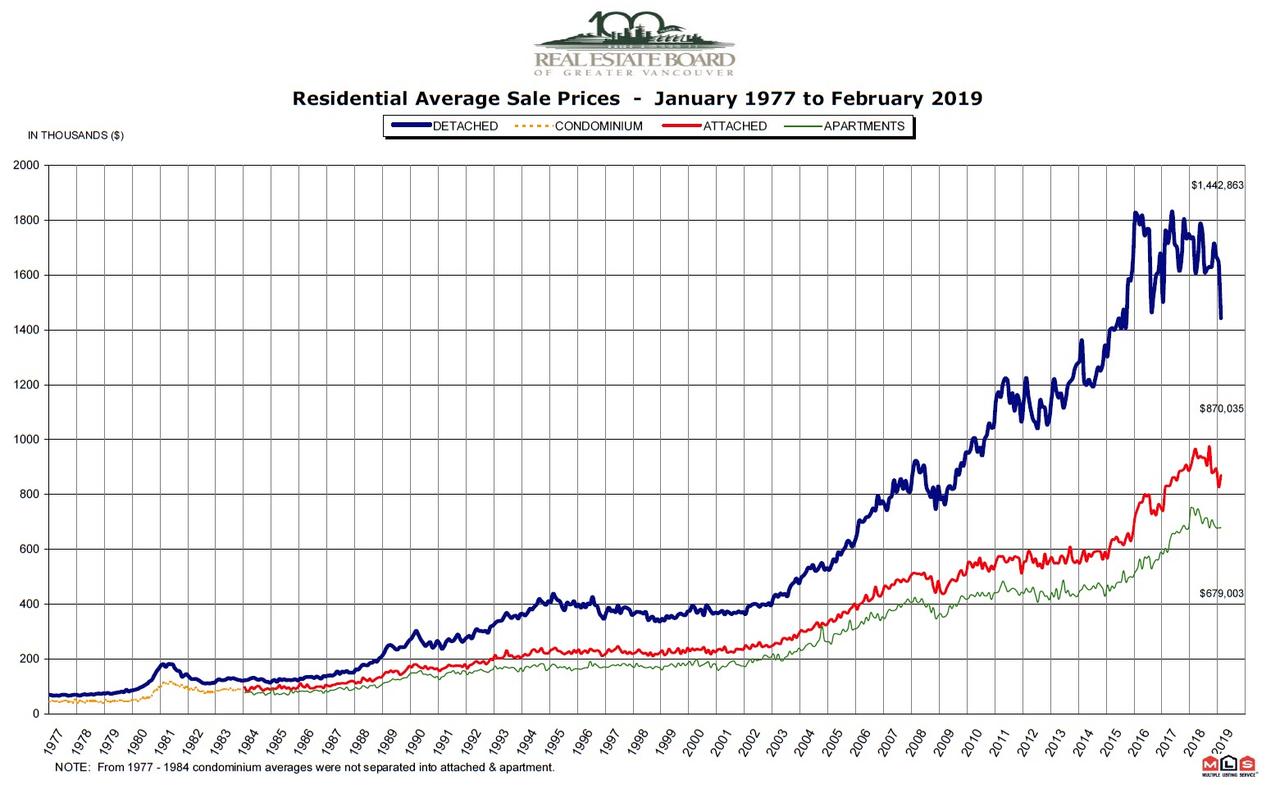
Toronto, Canada’s largest city, has held up better, with February prices rising 1.6% year-over-year, while new listings dropped 6.2% to outpace the 2.4% decline in sales. Nevertheless, TREB president Gurcharan Bhaura asked for regulatory relief from the mortgage stress test mandated by the Office of the Superintendent of Financial Institutions. These subject borrowers to the greater of the five-year benchmark rate or the contracted mortgage rate plus 200 basis points (Almost Daily Grant’s, May 31):
The OSFI mandated mortgage stress test has left some buyers on the sidelines who have struggled to qualify for the type of home they want to buy. The stress test should be reviewed and consideration should be given to bringing back 30 year amortizations for federally insured mortgages. There is a federal budget and election on the horizon. It will be interesting to see what policy measures are announced to help with home ownership affordability.
On the score of home affordability, there is certainly room for improvement. According to Demographia’s International Affordability Survey for 2019, Toronto ranked 294th out of 309 metropolitan housing markets, with a median house price of 8.3 times median annual gross pre-tax household income, up from 7.9 times year-over-year. For context, the United States national median multiple registers at 3.5 times, while the organization designates anything beyond 5.1 times to be “severely unaffordable.” Vancouver puts Toronto in the shade, ranked second to last by Demographia (only Hong Kong is more expensive) with a median multiple of 12.6 times.
Trade War Deepens: China Bans Canadian Canola Shipments Amid Soaring Diplomatic Tensions
Trade War Deepens: China Bans Canadian Canola Shipments Amid Soaring Diplomatic Tensions
Canada’s largest grain processor said Tuesday that Beijing has canceled its registration to ship canola seed to China, fueled by the arrest of a top executive for the Chinese tech giant Huawei, The Wall Street Journal reported.
The move suggests that rising diplomatic tensions between China and Canada are damaging commerce between the two countries. Tensions have already crushed hopes that senior officials in Ottawa and Beijing would develop further trade ties.
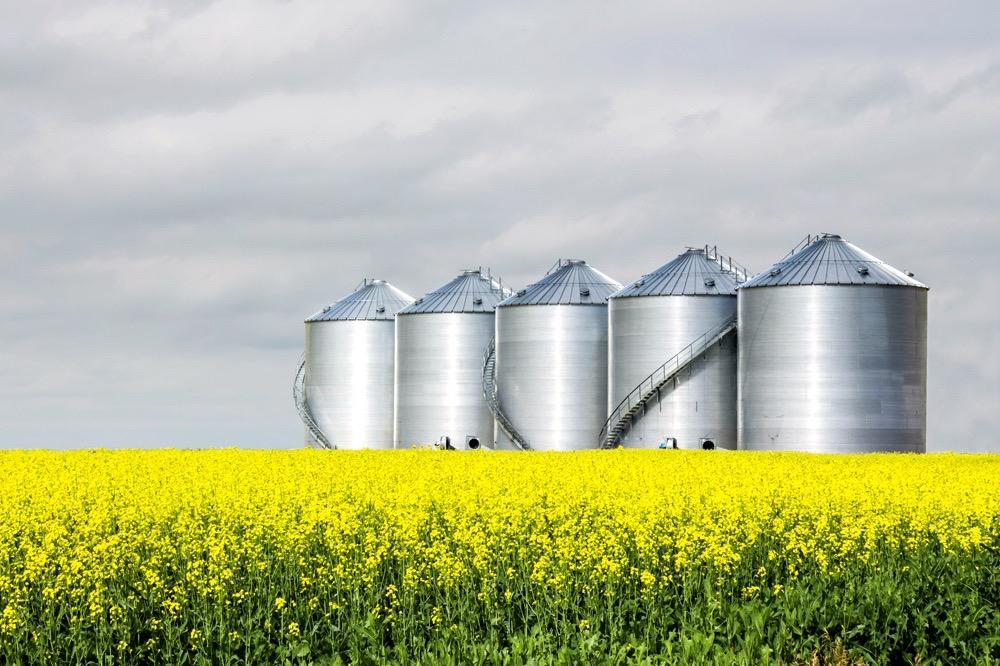
The import ban against Richardson International Ltd. is due to a series of Chinese non-compliance notices declaring some shipments of canola seed from Canada were contaminated with “hazardous pests.” Canadian officials disputed that claim.
“I am very concerned by what we’ve heard has happened to Richardson. We do not believe there’s any scientific basis for this,” Canadian Foreign Affairs Minister Chrystia Freeland said in Montreal.
“We are working very, very hard with the Chinese government on this issue.”
Revoking the import license comes as Canada is advancing an extradition hearing for Huawei CFO Meng Wanzhou. She was arrested in early December by the Canadain government at the request of the Trump administration, where she was wanted on fraud charges.
The Canola Council of Canada, located in Winnipeg, told the Journal that Richardson is a major player in the country’s canola seed to China.
Derek Brewin, a professor of agriculture economics at the University of Manitoba, said the Canadian agricultural and food manufacturing company easily controls 20% of total Canadian export capacity for grains and oilseeds.
The canola council said 40% of the industry’s exports end up in China.
Canada’s agriculture department said the country’s top agricultural export to China is canola seed, with sales valued at $2.05 billion per annum.
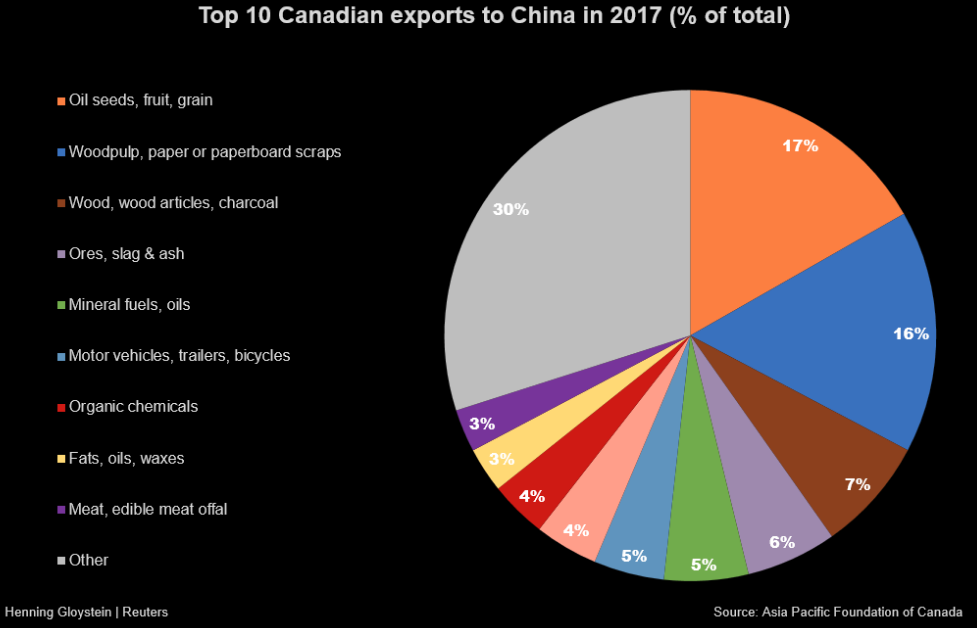
…click on the above link to read the rest of the article…
Canada In Recession? GDP Unexpectedly Drops For 2nd Month In A Row
Canada In Recession? GDP Unexpectedly Drops For 2nd Month In A Row
Canadian GDP just contracted for the second month in a row, leaving the headline Canada GDP up just 0.4% SAAR in 4Q, according to Statistics Canada (dramatically below the estimate of +1.0%). The headline quarterly change misses even lowest of economist estimates.
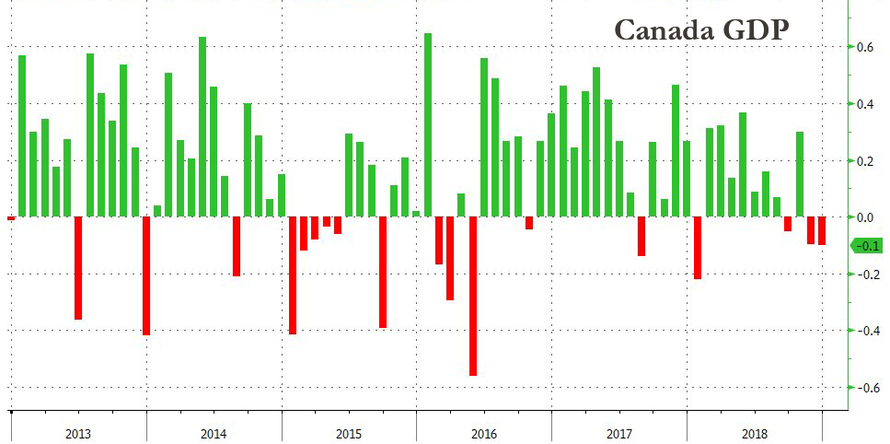
And on a YoY basis…
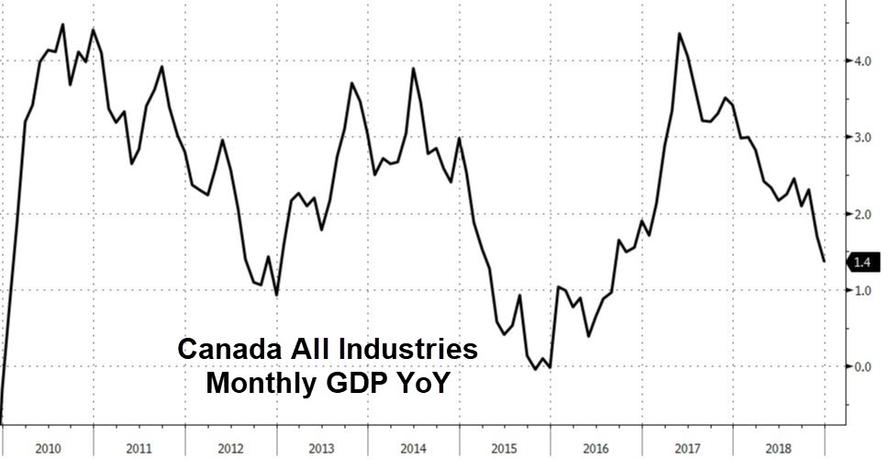
Under the hood it was just as ugly, with household consumption growth slowing further to 0.7% QoQ (weakest since 2015), investment and housing declining sharply, and helped only by an inventories accumulation (inventories added 1.53 percentage points to growth in 4Q).
Business gross fixed capital formation dropped 9.6% in 4Q, from -8.4% in previous quarter:
- Non-residential investment falls 10.9%, largest decline since 2016
- Residential structures fall 14.7%, biggest decline since 2009
Final domestic demand tumbled 1.5% in 4Q, from -0.5% in previous quarter
Worse still, first half of 2018 growth revised down to 2.0% from 2.3%.
But apart from that – everything is awesome and you should be buying Canadian stocks!!
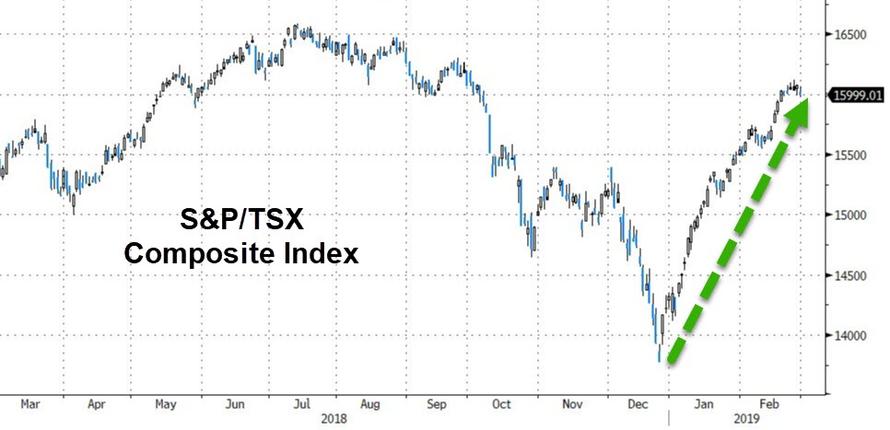
The result – as Poloz et al. are about to reverse all hawkishness even further – a tumble in the loonie…
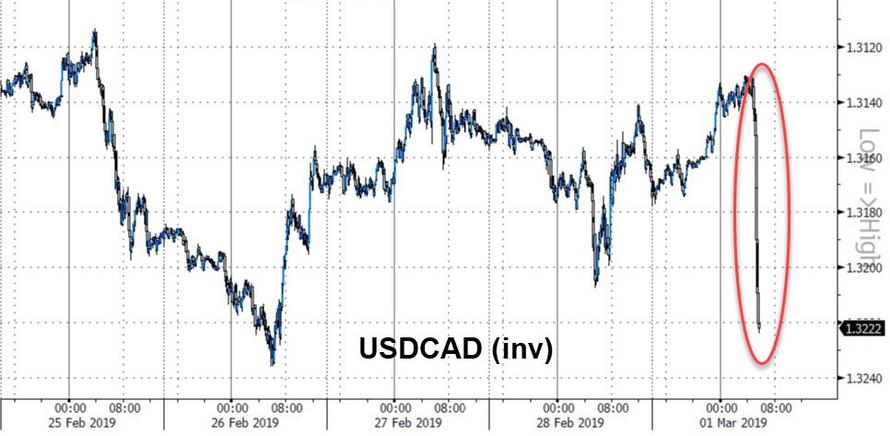
Will Trudeau Resign After Former AG’s Explosive Testimony?
Will Trudeau Resign After Former AG’s Explosive Testimony?
During a day where three concurrent Congressional hearings dominated the news cycle in the US, the testimony of Canada’s former Attorney General seemed to slip under the radar. But unlike Michael Cohen’s star turn in front of the House Oversight Committee, what former AG Jody Wilson-Raybould shared with lawmakers and the Canadian public actually might cause one head of state’s carefully constructed house of cards to come crashing down – just as campaign season is ramping up.
With roughly eight months left until an election where Canadians will decide whether to stick with – or reject – the progressive agenda of PM Justin Trudeau, a widening corruption scandal is threatening to take down the prime minister’s entire government. Two weeks ago, journalists at the Globe and Mail blew the lid off a scandal involving Trudeau and his closest aides, where the prime minister appeared to pressure Wilson-Raybould, then the attorney general, into offering a DPA to a Quebec-based engineering firm – then fired her when she refused to obey his demands. And after weeks of radio silence, she shared her side of the story during a widely watched (in Canada) Congressional hearing Wednesday afternoon.
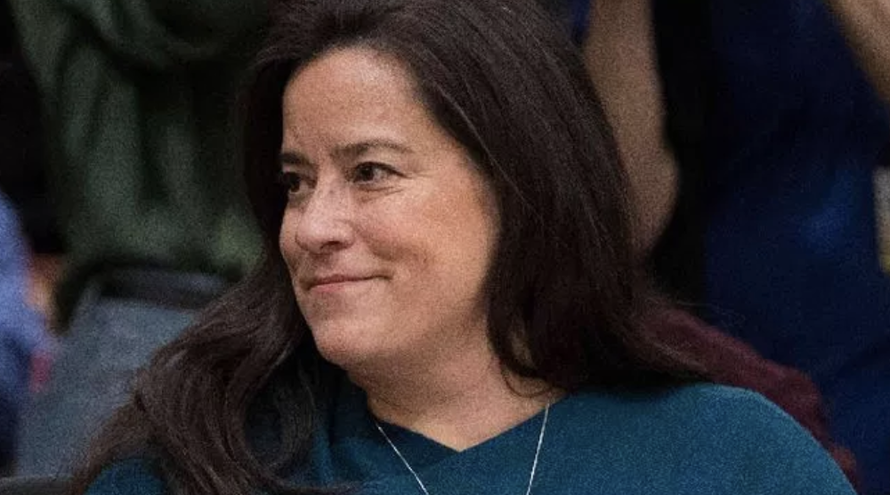
Wilson-Raybould
Answering questions posed by a conservative MP, Wilson-Raybould said she faced intense political pressure and veiled threats from at least 11 people involved in the government – either the PMO or the Privy Council Office – related to the SNC-Lavalin affair. She also said she was warned directly by Trudeau about the negative consequences should the company face prosecution, according to CBC. One close aide to Trudeau has already resigned over the scandal.
Wilson-Raybould listed the people she had warned about “the inappropriate nature of these conversations” after they “hounded” her about the affair, including Trudeau, Finance Minister Bill Morneau, Clerk of the Privy Council Michael Wernick and the (now-fired) senior senior aide to the prime minister, Gerald Butts.
…click on the above link to read the rest of the article…
Another Oil Train Crashes as Alberta Government Gets Into Oil-by-Rail Business
Another Oil Train Crashes as Alberta Government Gets Into Oil-by-Rail Business

The government of Alberta, Canada, the heart of tar sands country, recently announced plans to get into the oil-by-rail business. Attempting to work around a lack of pipelines, the provincial government intends to spend $3.7 billion to lease 4,400 oil tank cars and locomotives to export more Canadian tar sands oil to the U.S. The announcement came just days after the latest oil train derailment and spill in Manitoba, Canada.
Alberta Premier Rachel Notley addressed concerns about safety regarding the oil trains.
“We are treating the safety of these rail cars as though they are traveling through our own backyards,” Notley said. “The cars we will be using will be the safest cars on the tracks. They include the safest technology and meet the highest standards including all recent changes to safety standards.”
New regulations enacted after the 2013 oil train disaster killed 47 in Lac-Mégantic, Quebec, require oil and rail companies to use newer rail cars to move oil. And while these new tank cars — known as DOT-117 and 117Rs — are more robust than the older tank cars involved in the deadly incident, they aren’t immune to the forces of a train derailment.
In the past year, two Canadian oil trains consisting of these “safest” tank cars have derailed and resulted in large oil spills. In June 2018, a train from Canada derailed and spilled 230,000 gallons of oil into floodwaters in Iowa.
The most recent oil train crash, which occurred on a ranch in Manitoba on February 16, involved 37 derailed tank cars. No details have been released on the amount of oil spilled, but aerial photos show streams of dark black oil leaking from the damaged tank cars.
…click on the above link to read the rest of the article…
Canada and the Venezuela Coup Attempt
Canada and the Venezuela Coup Attempt
US presidents have bombed or invaded places like Grenada, Panama, Iraq and Sudan to distract from domestic scandals or to gain a quick boost in popularity. But, do Canadian politicians also pursue regime change abroad to be cheered on by the dominant media as decisive leaders?
In a discussion on regime change in Venezuela after last Monday’s “Lima Group” meeting in Ottawa, Conservative foreign affairs critic Erin O’Toole praised Canadian policy but added that the Liberals used the meeting of countries opposed to Nicolas Maduro’s government to drown out criticism of their foreign policy. O’Toole claimed the “Lima Group” meeting was “put together quite quickly and I think there are some politics behind that with some of the foreign affairs challenges the Trudeau government has been having in recent months.” In other words, O’Toole believes the Liberals organized a gathering that concluded with a call for the military to oust Venezuela’s elected president to appear like effective international players.
Understood within the broader corporate and geopolitical context, O’Toole’s assessment appears reasonable. After being criticized for its China policy, the Liberals have been widely praised for their regime change efforts in Venezuela. In a sign of media cheerleading, CTV News host Don Martin began his post “Lima Group” interview with foreign minister Chrystia Freeland by stating “the Lima summit has wrapped and the object of regime change is staying put for the time being” and then he asked her “is [Venezuelan President Nicolas] Maduro any step closer to being kicked out of office as a result of this meeting today?” Later in the interview Martin applauded the “Lima Group’s” bid “to put the economic pincers around it [Venezuela’s economy] and choking it off from international transactions.”
…click on the above link to read the rest of the article…
Canada’s Role in the Venezuela Coup
Canada’s Role in the Venezuela Coup

A letter was sent today to the Science for Peace list-serve in response to the Science for Peace Statement on the Government of Canada’s ongoing campaign to overturn the elected government of Venezuela.
Science for Peace is based in the Dept of Physics of the University of Toronto.
***
What is most welcome in this statement is its expeditious issue and wide-lensed comprehension of the hypocritically self-serving role of Canada’s state, major mining corporations and banks in the plundering of Latin American societies and interference in their internal affairs to ensure that it can continue on and grow against elected governments seeking self-determination. (now for the first time our foreign minister mendaciously publicly leading the alliance of the externally orchestrated oppression, exploitation and coup in Venezuela).
This exact passage deserves verbatim support:
“Canada has, in recent years, supported the replacement of elected governments in Honduras, Guatemala, Haiti and now in Venezuela, and its relations with Latin America are problematical in broader terms.
Canada provides a financial and legal haven for businesses that exploit labour and decimate the forests, agriculture, and watersheds in these countries. Canadian banks mire these countries in debt and buy up public utilities.
Protests against Canadian mining companies in Mexico, Peru, Bolivia and Guatemala are met with police and military brutality. In addition, Canada needs to maintain a distance from the far-right government of Jair Bolsonaro in Brazil. Bolsonaro, among other policies, threatens our common future by opening up the Amazon, the lungs of the planet, to deforestation for profit.”
I would like to add, however, that it is not only or primarily “the Trudeau government” that is “shaping its interventionist stance toward Venezuela”. It is, more specifically, Foreign Minister Freeland who also leads Canada and NATO towards massive militaristic operations on Russia’s borders, as well as warlike policies of the violent-coup established government of Ukraine with, as the right-wing states of Latin America, a chilling fondness for fascist military rule of the past.
…click on the above link to read the rest of the article…
From Canada, With Love
From Canada, With Love
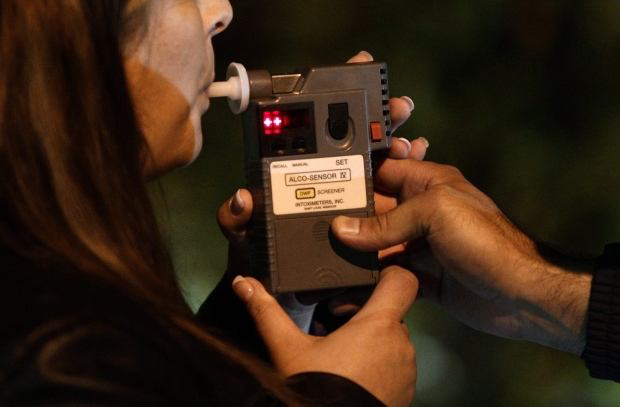
One thing inevitably follows the next – if the first thing is tolerated.
When the Supreme Court, America’s unelected legislative body, created an exception (several, actually) to the Fourth Amendment’s clear and definite prohibition of searches without having first established probable cause and without a specific warrant, the Fourth Amendment became a functional nullity – the equivalent of a plastic water jug shot through with holes.
One of those exceptions created out of thin air by the Supremes is the one which empowers armed government workers to randomly stop motorists who’ve given no reason to suspect them of having broken any laws – in order to force them to prove they haven’t broken any.
And (hopefully, from the viewpoint of the government) to find some they have.
This exception to what had been the Fourth – and Fifth – Amendment’s protections created Checkpoint America.
Which didn’t used to exist.
Millennials won’t remember that better, vanished time, but anyone older than 40 today can remember it.
Americans were once free to travel unmolested by the state’s armed goons unless the state’s armed goons could give a reason for molesting them, specifically.
Not arbitrarily and randomly.
Which is to say, unreasonably.
Public saaaaaaaaaaaaaaaaaaaaaaaaaaafety is given as the justification for the trampling of the Fourth and Fifth Amendments’ clear prohibitions of this checkpoint business.
“Someone” among the herd of randomly stopped cars might be “drunk” – or some other illegal thing, it is argued. One could of course just as easily turn this around and argue that any of the armed government workers performing the random stop/search mighthave just raped a child.
…click on the above link to read the rest of the article…
How Chrystia Freeland Organized Donald Trump’s Coup in Venezuela

How Chrystia Freeland Organized Donald Trump’s Coup in Venezuela
On Monday, February 5th, Canadian Foreign Minister Chrystia Freeland announced that the 14 countries of the Lima Group — who had actually formed themselves under her direction into this new group on 8 August 2017 in order to overthrow and replace Venezuela’s current President Nicholas Maduro — have now been joined (though she didn’t say to what extent) by the EU, and by 8 other individual countries. She stated:
“Today, we have been joined by our Lima Group partners, from Argentina, Brazil, Chile, Colombia, Costa Rica, Guatemala, Guyana, Honduras, Panama, Paraguay, Peru, and Saint Lucia. We have also been joined in our conversations with our partners from other countries, for this Lima Group ministerial meeting. These include Ecuador, the European Union, France, Germany, the Netherlands, Portugal, Spain, the United Kingdom, and the United States.”
She, along with US President Donald Trump, had, all along, been the actual leaders of this international diplomatic effort, to violate the Venezuelan Constitution blatantly, so as to perpetrate the coup in Venezuela.
Her active effort to replace Venezuela’s Government began with her formation of the Lima Group, nearly two years ago.
Canada’s Ottawa Citizen headlined on 19 August 2017, “Choosing Danger”, and their reporter Peter Hum interviewed Canada’s Ambassador to Venezuela, Ben Rowswell, who was then retiring from the post. Rowswell said that Venezuelans who wanted an overthrow of their Government would continue to have the full support of Canada’s Government: “‘I think that some of them were sort of anxious that it (the embassy’s support for human rights and democracy in Venezuela) might not continue after I left,’ Rowswell said. ‘I don’t think they have anything to worry about because Minister (of Foreign Affairs Chrystia) Freeland has Venezuela way at the top of her priority list.’”
…click on the above link to read the rest of the article…



